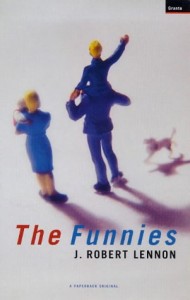TW Interview by Lorraine Berry
I first became aware of J. Robert Lennon in the late '90s, when I’d been living in Ithaca, New York, for a few years. His second novel, The Funnies (Riverhead Books, 1999), had just been published to critical acclaim. I noted that he taught at Cornell University, where I was a graduate student at the time.
 The Funnies is about the real dysfunctional family behind a cartoonist's wildly successful newspaper cartoon about family life—think "Family Circus." While the book was a work of fiction, it invited the mischievous thrill of speculating what kind of family Bil Keane might have had.
The Funnies is about the real dysfunctional family behind a cartoonist's wildly successful newspaper cartoon about family life—think "Family Circus." While the book was a work of fiction, it invited the mischievous thrill of speculating what kind of family Bil Keane might have had.
Since then, Lennon has published five more novels—including the mysterious, multiple-reality novel Familiar (Graywolf Press, 2012), one of my top picks last year—and three collections of short pieces. In addition to his literary output, he's a musician, currently playing in the Starry Mountain Sweetheart Band.
In his blog, Lennon recently argued that writers need to engage with genres and experiences beyond the most recently anointed literary fiction:
Let's face it: literary fiction is fucking boring. It really is. It's a genre as replete with clichés as any.... If a writer of literary fiction wants to be great, she needs to poke her head up out of the echo chamber every now and then and absorb the genuine peculiarity of human striving.
 I eventually met Lennon at the Colgate Writers Conference in nearby Hamilton, New York, where he teaches each summer. (Ithaca is a small town, after all.)
I eventually met Lennon at the Colgate Writers Conference in nearby Hamilton, New York, where he teaches each summer. (Ithaca is a small town, after all.)
In January, I conducted this email interview with him, focusing on questions about teaching writing (he is currently Chair of the MFA program at Cornell) and about his relationship with Ithaca's community-owned bookstore, Buffalo Street Books. The resulting Q&A has been condensed and edited for TW.
TW: Do you think there are advantages for writers who remain creative writing professors? If not, how does being a creative writing professor hamper your work?
JRL: The main way it hampers my work is that it gives me less time to do it. My main creative periods are the summer and winter breaks, and the occasional leave. It’s rare that I do new, sustained work while teaching—I’m sometimes able to write short stories.
But I do like being a professor. I like young people, and I like talking intensely about what I do. Cornell students are very smart and motivated, and they allow me to spend most of my time at work engaged in pretty sophisticated discussions. I’m grateful to them.
TW: When you’re working with a student whom you believe to have exceptional talent, what do you think your role is?
JRL: If it’s an undergrad, I try to get them into my office often to talk, throw them some interesting assignments, get them to pay attention to some of the more subtle aspects of good prose. Many talented undergrads don’t know they’re talented and may have other plans for their lives. I try to get them to commit at least a part of their future to writing.
A grad student is a little different—they are closer to my age, they know they’ve got something going on, and it’s likely that some of them are going to be more famous than me, really soon. Indeed, I envy the talent of many of them. Once they get their degrees, I regard them as peers, and try to treat them that way.
TW: What do you do with undergraduates who don’t have what it takes? Do you see your role as a gatekeeper?
JRL: Well, on the one hand, hardly anyone is going to “make it” as a writer—but on the other hand, more people probably have what it takes than we might think. The only gatekeeping I do with undergrads is when more than fifteen of them try to get into my advanced workshops, and I have to cut some based on their manuscripts.
I hate doing this, because I’ve been wrong about students over and over again. The hotshots often flag before they graduate, while the hopeless cases turn out to be brilliant in some undiscovered way.
TW: Do students surprise you?
JRL: Every day.
TW: Buffalo Street Books, Ithaca’s local independent bookstore, nearly closed before becoming a cooperative. How involved were you in the process of saving BSB?
JRL: My wife and I bought some shares, and she served on a transitional board. Mostly, I’m just a loyal customer.
TW: I know that you have given readings at BSB. What makes you work with them rather than the local big-box bookstore that also exists in Ithaca?
JRL: Barnes & Noble has never asked me to do a reading. If they did, I would, though I’d do the BSB reading first!
TW: Do you think writers owe something to independent bookstores?
JRL: No. I feel that I owe something to Buffalo Street Books, because I love the place, and they treat me well, and my friends run it. But in general, I am agnostic when it comes to the various models for selling books. I like e-books and have a Kindle, despite my displeasure at some of Amazon’s business practices. I don’t particularly like big-box stores, but in their heyday, they brought new options to underserved readers, in communities without good bookstores.
As a writer, I benefit every day from both big-box stores and Amazon as well as indies. I can’t go around denouncing businesses that sustain my work. Personally, the indies are where my heart is, and where most of my consumer dollars go, but it’s hard enough writing the goddamn things without having to worry about how they’re being sold.
TW: Your writing crosses genres. How restricting do you think genre writing remains?
JRL: Anyone can write whatever they want. I’ve never felt restricted in any way.
Of course, there are genres with certain unwritten rules, and I do like some of the fiction that comes out of them. But the nice thing about literary fiction is that it can be anything it wants. It is a genre, too, of course, and it is susceptible to its own set of clichés. But it’s a very permissive environment, and that’s one of the things I like best about it.
TW: Do you have an opinion on whether gender still plays a role in who gets read and reviewed?
JRL: Yes, of course. Men are taken more seriously than women. Not by everyone, and not all the time, but women generally have extra weight to bear in the marketplace of ideas. And smart women are rewarded more often, and more generously, for keeping it light, or looking cute, or conforming to stereotypes, than they are for being serious.
I actually think writers of color and other hyphenated Americans are doing better, in terms of respect from critics and readers, than women are. America seems to desire strong non-white voices and stories from immigrants. It’s not just interest in the “exotic”; these writers really have things to say that we need to hear right now. But as always, women seem to be dealing with the same old bullshit.
Publishing Information
- “Don’t Read More Literary Fiction: A Response to Dan Chaon” by J. Robert Lennon on his blog, March 29, 2013.
- “What Makes a Writer Want to Rock Out?” by J. Robert Lennon, New York Times Magazine, February 15, 2013.
- “What the National Book Awards Missed” by Lorraine Berry, Talking Writing, November 16, 2012.
- Website for Buffalo Street Books
- Website for J. Robert Lennon Dot Com
These days, I write my fiction in the same room where I practice and record music: a larger, brighter and rather less damp space than my moldy old basement cell. My writing notebooks share a desk drawer with a bunch of guitar picks and harmonicas, and it turns out that packed bookcases make better acoustic treatments than egg-crate foam. I’m not sure if I’ve elevated the status of music in my life or knocked my writing off its high horse or what. But the two are living pretty comfortably here together.
—“What Makes a Writer Want to Rock Out?” by J. Robert Lennon
